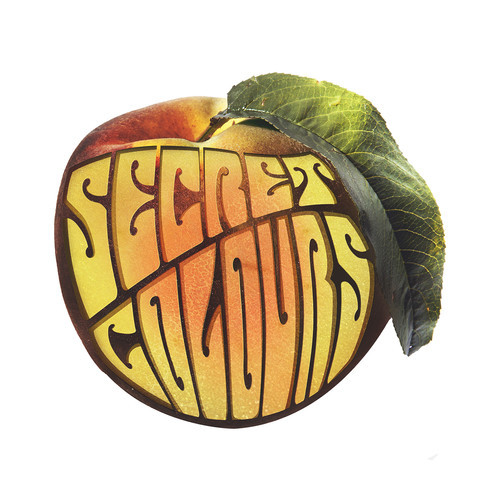“Psychedelic is just like an all-encompassing term people like to use. If it’s out there and it’s groovy – it’s psychedelic,” said Secret Colours’ guitarist Dave Stach in a recent interview. He hits upon a valid point about the way in which the band which he’s a member of will likely be classified along with addressing the bigger issue of easy tagging when it comes to bands that listeners feel a need to assess and judge quickly. Considering Secret Colours waver about somewhere between the sounds of ’60s rock and the hazy ’90s Britpop equivalent, one might be forgiven for reverting to the term “psychedelic.”
The thing is though, when I think of psychedelic, I think of something caught between the rock and jazz genres, playing with grooves and riffs, and dosing them in kaleidoscopic reverb without letting a relentless ferocity tame itself in front of the microphone. Consequently, going by the songs on Secret Colours new album, Peach, I wouldn’t hasten to class them as psychedelic. If anything, it’s a stopping point for them on their musical journey: on “Euphoric Collisions” an acoustic guitar fights off reverb from an electric before it submits to its playful riffage while on “Faust” vocalist Tommy Evans shouts in the distance as guitars start and stop; the latter half of “Blackhole” trembles with the reverb; opening track “Blackbird (Only One)” throws some reverse effects into the mix. Elsewhere they’re sticking to the sidelines of those aforementioned decades and create music that evokes the sounds from those eras.
It Peach succeeds at one thing it’s the impressionable feeling of nostalgia you take from it during the first listen. It keeps hold of a feel that producer Brain Deck might be attributed to, but unfortunately at the same time the band are trying their best to shake the shackles of eras past. This is good when they’re merging the past and present, like on “Blackbird (Only One)” which injects some New York punk/rock into the mix, but after more time with Peach, the initial impression begins to wane over the fifty-four minutes. You still hear the influence from times past, but never does it fully dissolve away, nor does the band create something that’s completely their own.
There are some exceptions: “Freak” captures a low-light atmosphere, like you’re hearing the band from the back of seedy bar while aforementioned “Blackbird (Only One)” channels the one-word charm of ’90s Britpop bands and takes it through a hazy pathway.“Blackhole” is the shining moment here, though. With stuttering drum machines, “Clint Eastwood”-inspired melodlica, and deep acoustic guitar sounds, it feels like an exploration of texture and a feel more than anything else. Unfortunately there’s barely any other evidence of similar consideration across Peach. “Me” tries for a similar outcome in a major key, but like tediously overlong title track, it drifts by aimlessly instead of feeling like a journey during its runtime (and with these tracks, the sound of the melodica soon wears thin, especially since it sounds like it’s just exhaling different versions of the same derivative melody).
Occasionally the band even touch on the sound of bands from this age, albeit different versions. Eric Hehr’s clunky bass riff combined with Evans’ enthusiastic yelps on “Lust” makes for something that sounds like Kasabian – if they started as a band ten years earlier. “Who You Gonna Run To” and “My Home Is In Your Soul” could be slowed-down Franz Ferdinand songs via a different era of Spoon in a near-alternative universe, but thankfully the band move away from such cumbersome descriptions and carry the tracks to pleasing, if not unbrilliant conclusions.
With an album cover like it has, Peach was always going to be an exercise in nostalgia in some way or another. There’s nothing wrong with such an aim, but for Peach to be a better success, the band should have decided more clearly if they were coming or going. When they’re moving forwards, they’re great, as evidenced on “Blackhole,” and even when they get into a steady jam, they’re perfectly likeable (see the casual blues swagger of “World Through My Window”), but there’s not enough definition here. They’re good at capturing the ’90s Britpop sound (Evan’s almost English singing voice and the fact that the Chicago band spell the word “colour” in the British way help this case, too) and had the sound of the ’60s been more heavily indented in their sound, then it might have made for more of a contrast, but Peach teeters about too often – so much so that calling it psychedelic doesn’t feel entirely correct.

